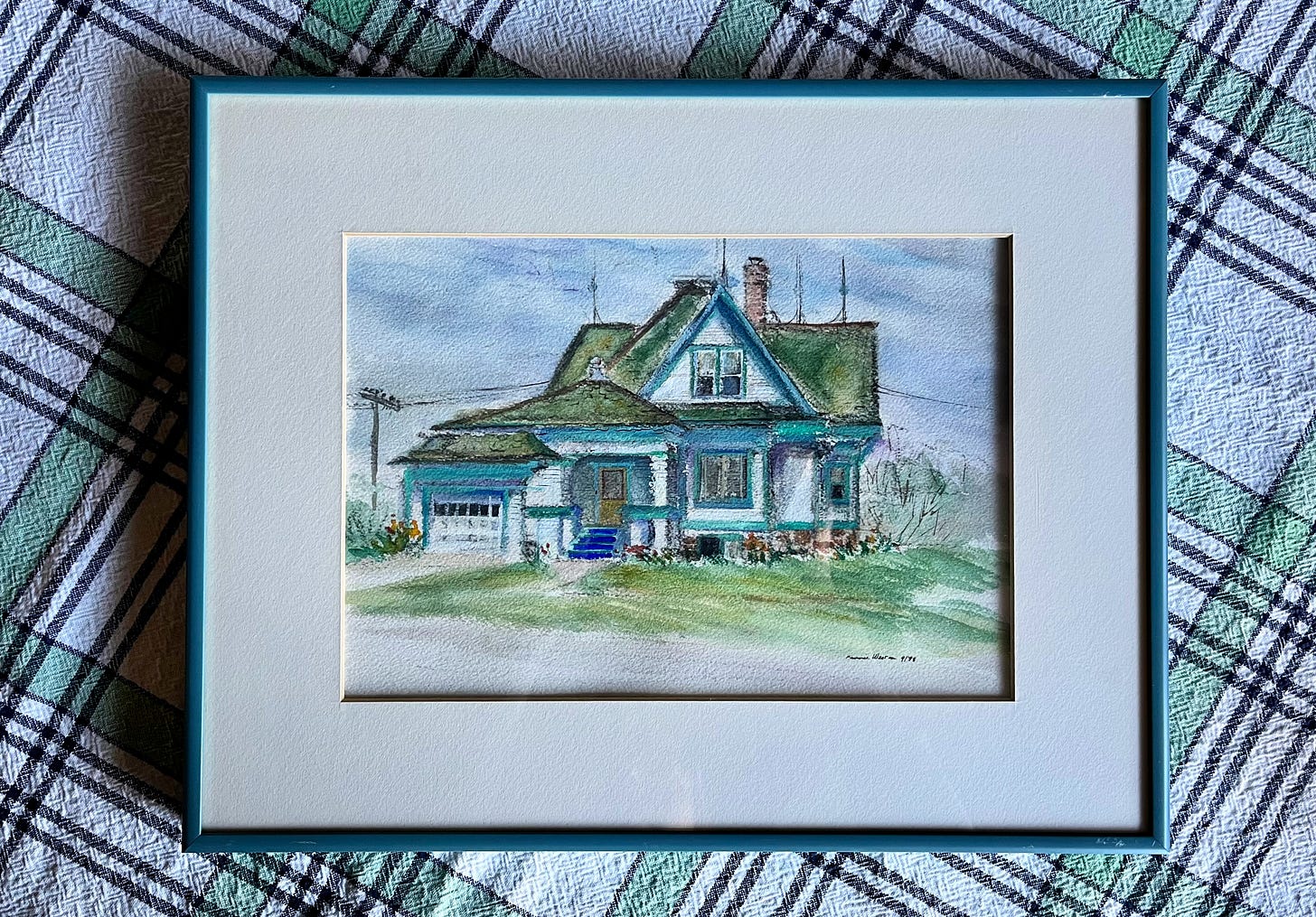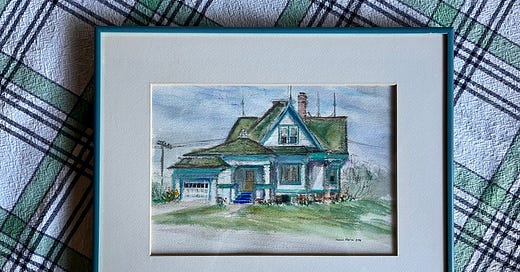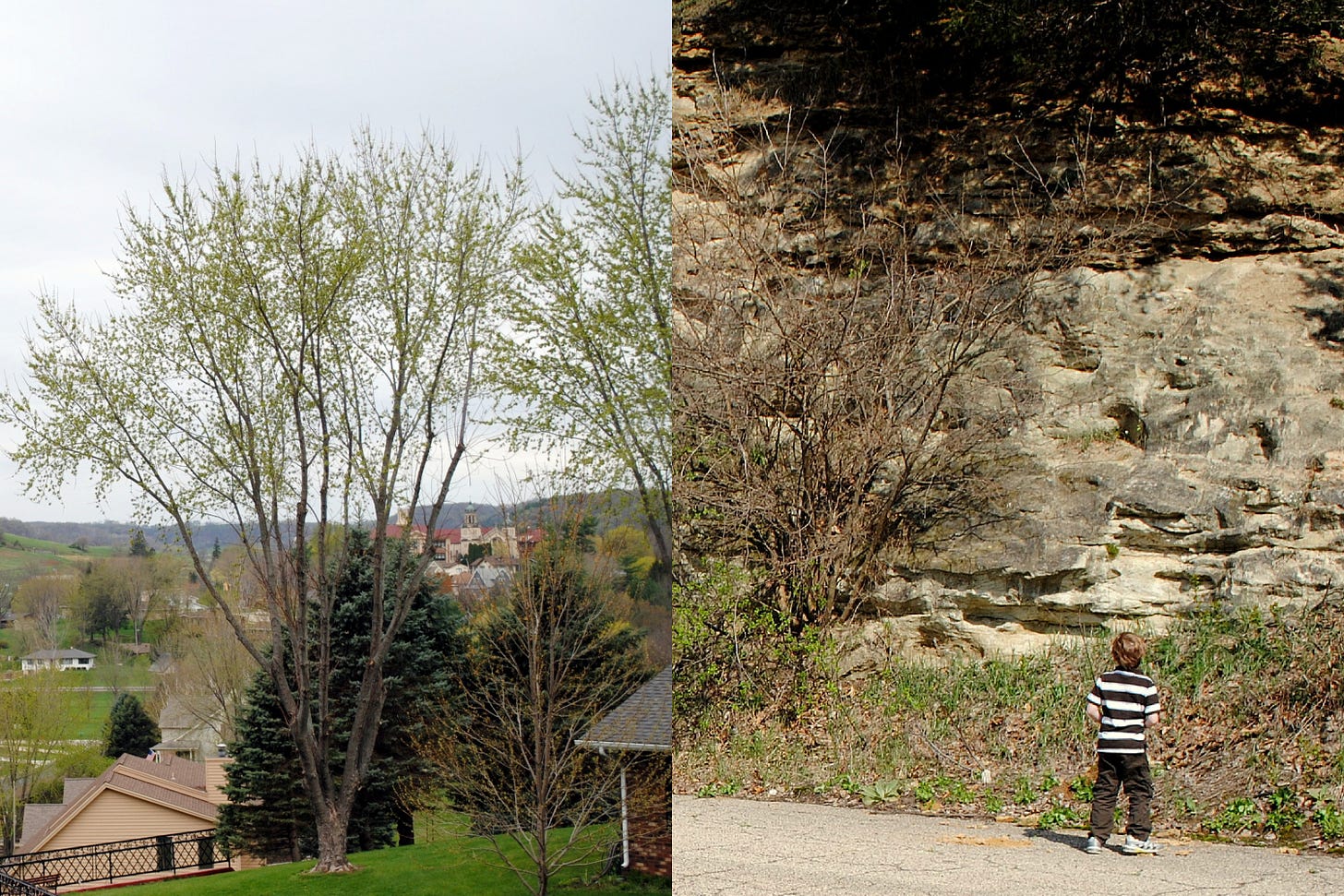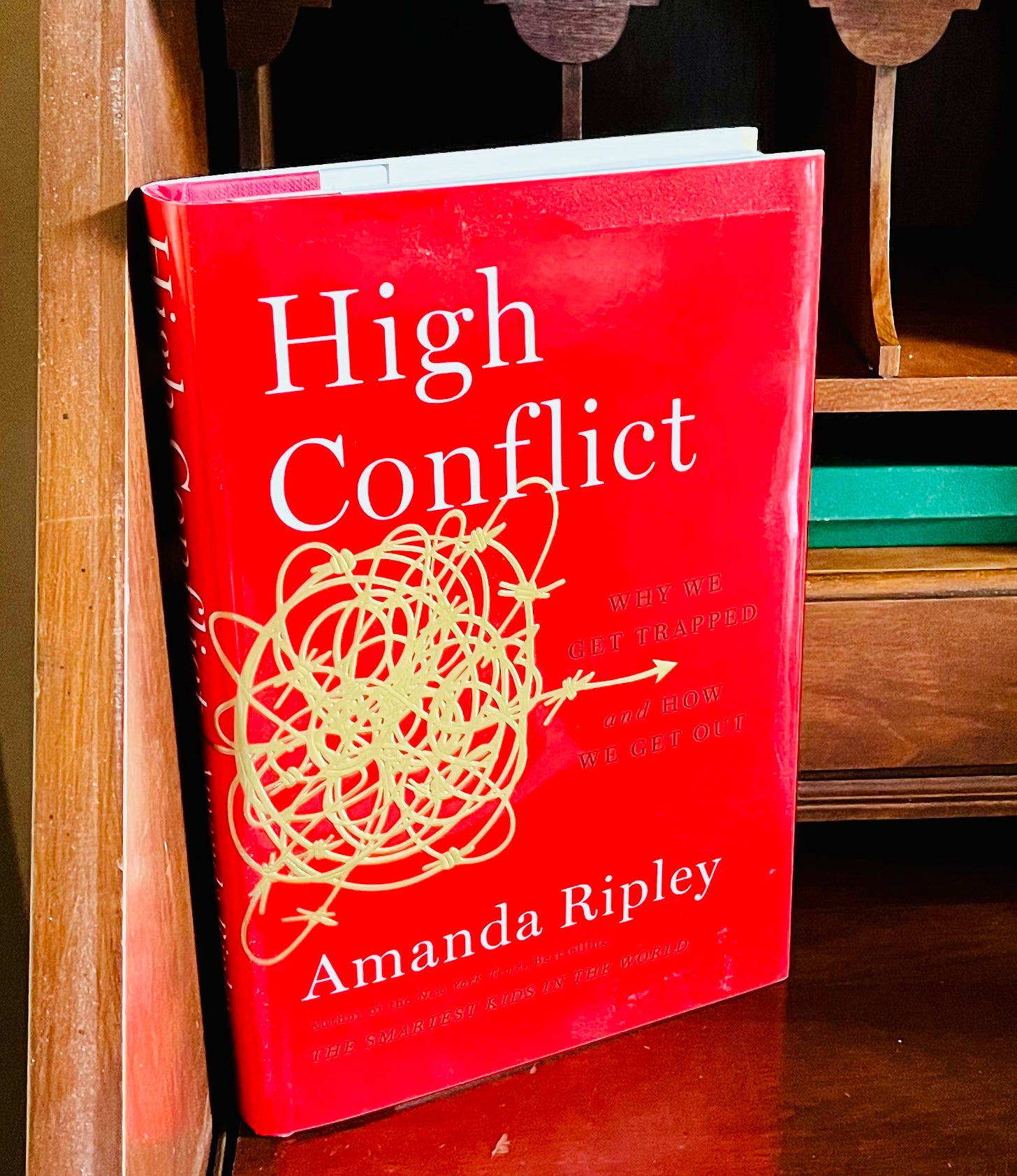Picking a side, the always-present past, and never-ending drama—that's family for you
By nature, family relationships are emotionally charged. But in the midst of conflict, emotions become supercharged. Figuring out what to do is messy.

I do know there are sweetly quiet and mostly agreeable families like my husband’s. They have barbecues and potlucks and talk about movies and past up-north vacations by a lake. They talk—one at a time—with pauses in between that stretch out while figuring out whose turn it is to go next.
I don’t think I’ve ever even heard my husband’s family argue since I first met them—in 1993. Of course, all families have stuff. But their stuff is mostly comfortably stuffed away. My family’s stuff was dramatized, debated, and divisive. You had to pick a side: this one or that one. No changing your mind. And no giving up on changing theirs.
Voices on top of voices grew louder at family gatherings as conversations jumped from one hot topic to another. But after all the words, ideas, and passion-filled expression, things always ended up where they started, ready to do it all over again next time.
Changing patterns in families is really hard. But change does happen. It’s just that most change isn’t the kind that’s chosen, expected, or even imaginable.
The unexpected and unimagined
Dad’s death in 2008 left a silent void with his booming, too-big-for-britches voice suddenly gone. No matter which side you were on—everything about him was missed. A muffling of any negative feelings about him seemed like a natural, self-imposed first step in the mourning process. Some stayed in that place, and I understand that. But I couldn’t keep holding the bad feelings about Dad in as time went on.
“Don’t speak ill of the dead” felt right early on in the mourning process. But keeping illness inside felt like it would kill me too. “And besides, speaking honestly isn’t the same as speaking ill,” I told myself. Since then, I’ve even come to believe it honors a person’s life by learning from them. And I’ve found that talking about the “bad” feelings has allowed me to remember the “good” ones too.
Mourning is personal and differences should be respected. Mourning can be healing too.
Opposing views
After Dad was gone, the mom-versus-dad division in our family slowly faded away, and a new solidarity grew across sides. We bonded over thoughts of how things could have been while sharing memories and longings for what will never be. Things I didn’t think were possible happened.
Decades after my parents divorced, my Grandma Marie gradually softened her steely stance that Mom wasn’t “allowed” to set foot in my Dad’s family’s hometown. For over 30 years she held a grudge against Mom for breaking the “‘til death do us part,” no-matter-what Catholic marriage rule when she divorced my dad—her oldest son, who she loved but also couldn’t be around for more than a day or two without a disastrous argument erupting between the two.
Eventually, Grandma even let my mom inside her new castle, the little yellow ranch high up on the top of the same hill she used to walk up to bring the cows home as a little girl. Her later-in-life second home didn’t smell of concentrated Lysol disinfectant like her first turn-of-the-century craftsman on Cedar Street. But it had the same feel as a still-life painting: prearranged and pleasing yet quiet and guarded.
Both houses also had opposing views. Grandma’s first house had a beauty shop and Bavarian butcher out the front and a construction company out the back. Her new front view was a fortress rock wall. Opposing that was a hilltop back view overlooking the tiny town centered around a Baroque-style Catholic church perched on an even higher hilltop in the distant view.
In 2016, my mom joined my family on a visit to my grandma’s. It felt surreal, seeing them together in my grandma’s sunlit living room talking to each other. That hadn’t happened since 1983. The warm stillness felt dreamy. This was the moment I’d always wanted.
Conversation was slow to start. I stared at the sunbeams flickering through the room’s air, devoid of the dancing dust particles one might expect. Grandma cleaned her house like nobody’s business right up until she died a few years later. She died in the best of ways, in her home while her health was still good. And she was ready to go. The ticker tape in her head told her so. She fell asleep while reading her Catholic magazine and never woke up.
I’m very grateful for that day and that my mom and grandma reconciled before it would’ve been too late. The two sides of my family—the two women I came from—were together peacefully. That was monumental and brought closure and peace. But it didn’t make me feel whole again, like I’d always thought would happen if the two sides of my family were brought back together.
Soon, the conversation shifted ever so slightly to the uneasiness of the upcoming presidential election and the cultural changes underway, which also felt surreal. Wading into those waters while feeling the shifting sands beneath, the feeling of togetherness became fleeting and hard to hold. As the conversation grew, it became clear: they were on one side, and I was alone on the other.
After nearly a lifetime of being between my mom and grandma, I felt apart and separate from both of them. I couldn’t help the feelings. Or the wandering thoughts that followed. Maybe I’m more than the parts of people I come from. Maybe everyone is. And maybe we’re all on the same side, we’re just looking out different windows with completely different views.

Saccharine sweet to sickening
I should’ve known. Nothing I’ve ever wanted in life ever turns out how I imagined. Mostly, that’s a good thing—I’m a worrier. Most things actually turn out better (or not as bad) as I expected them to be. And the things that end up worse happen in a different way than I imagined. After fifty years of seeing those odds, I’ve finally realized that most worry is a waste.
Looking back at the early 2010s, though, it should’ve been obvious something was coming. The mood felt too “Candy Crush” sweet to last forever, no matter how many times Pharrel Williams beckoned everyone to clap along and be “Happy.” If everyone can be happy, then of course, “Everything is AWESOME!!!”
“Everything is better when we stick together / Side by side, you and I are gonna win forever / Let's party forever / We're the same, I'm like you, you're like me / We are working in harmony” — Tegan and Sara feat. The Lonely Island
Some turn towards turbulence seemed inevitable at the saccharine-sweet peak in 2014. If everyone is telling you life is so sweet and wonderful over and over, eventually, people might feel even more annoyed when it’s not. I get that. But what was hard to understand was the growing narrative that everything was awesome “back then,” and bringing it back now will make everything awesome again.
Nostalgia is a weird thing as I wrote about before: “One person’s feel-good nostalgia can be another person’s nightmare. And I remind myself if someone seems emotionally upset about something from the past, there’s a reason. Just believe them.”
Emotionally charged to supercharged
I spent the following years trying to keep that The Lego Movie song out of my head as I constantly tried to keep little Legos left by my older kids out of the hands of my youngest. That felt like a whole job itself. I was in my busiest mom years, with a toddler to a teen and two in between. Lots of drop-offs and pick-ups, all logistically challenged with a baby and older kids at three different schools. Though I was doing a lot (and driving a lot), I still had lots of brain time to worry and scroll and talk handsfree on the phone.
Underneath the cheery cultural overtones, trouble had been brewing since the decade began. You saw it in the unfiltered messages and comments shared and liked as people went online to find their tribe, vent frustrations, and find clarity down different rabbit holes that made sense to them. With each new piece of information found, you grew more confident it’s right and certain, making you feel certainly right too.
As the sugar-coating from that saccharine-sweet peak wore off, it brought into view just how much crap had been sugar-coated for so long with little questioning. That seemed to be the best part of the decade. Finally, FINALLY, maybe some real conversations can be had and real changes made. But the problem was, when people saw what was underneath, they not only had different feelings about what they saw. They literally saw different things.
Picking sides: The new fault lines
The new fault lines divided my family on different sides of issues that hadn’t been “issues” since they were for my Archie and Edith grandparents. And in 2010s fashion, they were framed as thumbs up or thumbs down—wasn’t that like a middle school thing? No, actually, I think it was like third grade.
Most of us weren’t even on Facebook. But account or no account, Facebook was in everyone’s face, influencing relationships and perceptions of the world and everyone in it and drawing everyone into drama with consequences unfitting even for a silly middle-school game.
Disrespect became an accepted norm, entering real-life conversations, drawing sharper contrasts and reaching punchy conclusions. In this hyperbolic reality TV version of life there was a lack of thought about what anything might really mean, or more importantly cause. But regardless of what you knew, the undertow pulling you in was always there.
Most everything online made me feel worse. And as the on- and off-lines blurred into one, everything felt worse. You can unfollow, silence or click away from the vast, overwhelming world online. But what do you do when the pull comes from within your own family and people you love? How can that not feel personal and impossible to ignore?
I wrote about the Catholic cultural divisions in my family in this post:
I was tip-topped with anger and hurt over the reaction by some after our daughter came out. I was dumbfounded by the growing differences in what were once considered generally accepted basic facts. And I was disturbed by the merging of our Catholic faith with political ideology.
I’m grudgingly accepting that I’ll never fully understand most people and things. I’ve also learned that trying to convince anyone “I’m right and you’re wrong” rarely works, mostly backfires, and brings out the side of myself I don’t really like—and don’t have the energy for being anymore.
One thing I’m not giving up on is this: Fostering belonging without fixed, fake, or forced conformity is worth investing in, even when it’s not easy.
Working through conflict
Family relationships are, by their nature, emotionally charged. And in the midst of conflict of any kind, emotions become supercharged. Sharing experiences can sometimes help you feel unstuck or less alone, but every family situation and person’s experience is unique. Changing patterns that’ve been in place for decades doesn’t happen easily.
Here are a few things that helped me while working through family conflict:
Avoid triangular conflict: Resetting several interconnected relationships at once is incredibly difficult. Focusing on one relationship separately and keeping the discussions private during the process helped me in this situation.
Consider the can of worms: Working through conflict means things might get worse, and a better outcome isn’t guaranteed. I don’t try to avoid conflict because of that, but sometimes, addressing conflict in real time is too much for that moment in life (on either side). Leaving it in the can for now might be a better option.
Get professional therapy if possible: Talk therapy helped me practice saying hard things out loud in a safe, neutral space. And that helped me have hard conversations that needed to be had.
There’s no easy fix though, and change takes time. And sometimes, it’s not possible to work through a relationship.
I wasn’t able to work through conflict issues with Dad before he unexpectedly died at age 60. Dad didn’t listen (I don’t think he even knew how), would never admit even being a tiny bit wrong, and was by his nature insensitive. So how do you work with that? But I don’t think I was ready to make peace with him or admit any mistakes then either. Our relationship was left at an arms-length distance, though I absolutely gave him a hug the last time I saw him—and I’m so glad I did.
No easy answers, but here’s what I’m doing
It’s SO easy to make things worse. And it’s REALLY hard to make anything better. Sometimes, not making things worse is a win, as unsatisfying as that may be. So what do you do? There are no easy answers or one way that’s “right” or even possible for everyone. This is what I’m doing (and trying to do) for what it’s worth.
“Distance is better than drama” is a general approach I take if I’m feeling overwhelmed or when the drama seems pointless or petty. I know I’ve created plenty of my own bad drama over the course of my lifetime. I don’t want to feed into that anymore. At times, it’s tempting. But I know it never leads anywhere good—just don’t take the bait, I remind myself. And don’t put it out there either.
That doesn’t mean, “Oh well, whatever.” There are fights worth having. But I only want to do stuff worth doing—meaning stuff that might help. These are some things I’m trying to keep in mind while managing my personal relationships:
Why I think someone thinks, feels, or does something is often different from why they actually do.
My decisions and beliefs are shaped by my experiences, my perceptions, the people I’m close to, and whether I feel safe. Theirs are too.
Feeling safe is so important, and safety can mean different things to different people and contexts.
Feeling aligned with others feels good. But total alignment may be a warning sign. Someone may not be saying something that needs to be said. Or they may be saying something only because someone else wants to hear it. That someone might even be you without even knowing it.
Change is always possible. I can’t think of anyone I know who hasn’t changed over time, often in surprising ways.
I’m also trying to focus more on asking, “What can I do to help?” And I’m looking for new ways that are more effective and less about me. But to get here, I had to understand my own story first.
I highly recommend ’s 2021 book, High Conflict, if you’re facing conflict—of any kind. That kinda seems like everyone lately. I read the book when it came out and it’s given me some practical tools to work with and try at times when nothing seems to help. It’s still on my nightstand because I frequently need to re-learn the process.
When Your Dad's a Jerk, Is it OK to Accept His Love?
My dad was an abrasive, unaware, selfish jerk. But that was only one side. Did his loving side count too?












Messy is a good word for the state of the world right now. It's great that you're staying aware of all of it. We should all be brave enough to do so. Thanks for sharing this... all very good nuggets!